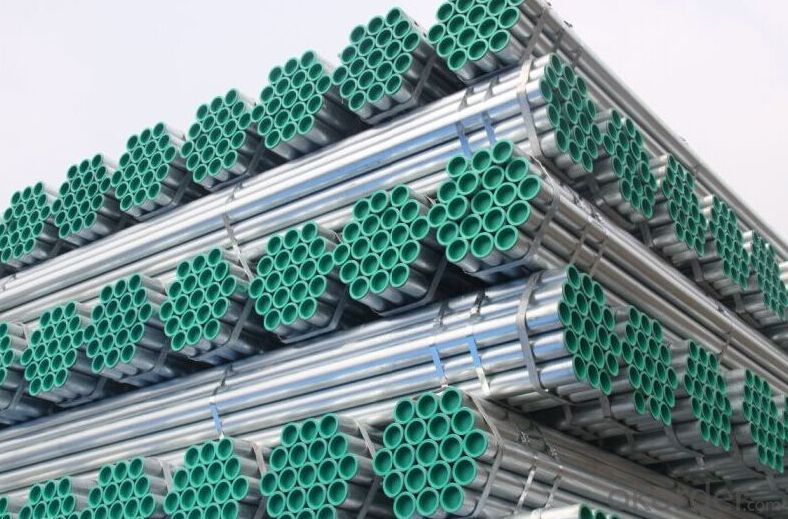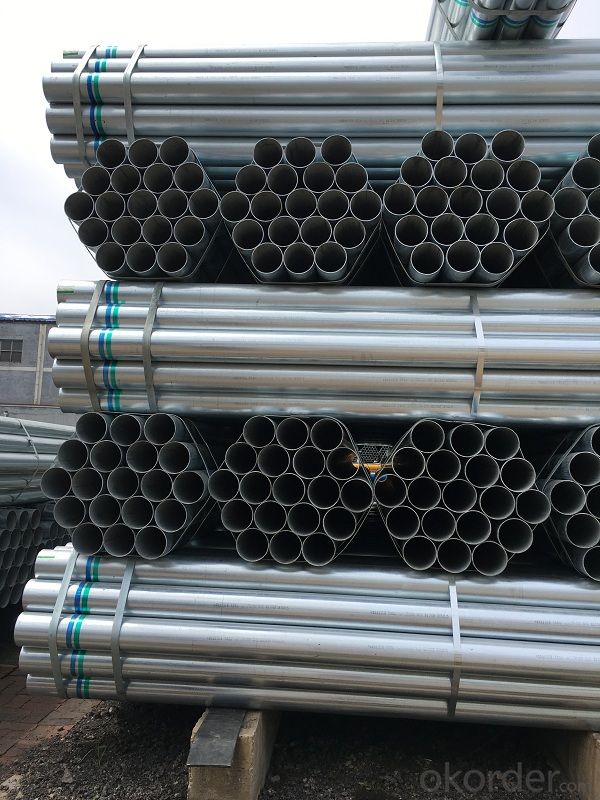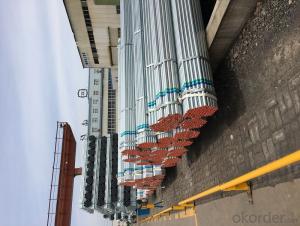Hot dip galvanized welded steel tube for structure
- Loading Port:
- Tianjin
- Payment Terms:
- TT OR LC
- Min Order Qty:
- 20 m.t.
- Supply Capability:
- 10000 m.t./month
OKorder Service Pledge
OKorder Financial Service
You Might Also Like
Item specifice
1、 Hot dip galvanized welded steel tube for structure:
The surface of galvanized steel pipe welded steel pipe of hot dip galvanized layer or. Galvanized can increase the corrosion resistance of the steel tube, prolong service life. Galvanized pipe is widely used, in addition to water, gas, oil and other general low pressure fluid pipelines. It is also used in the petroleum industry, especially for offshore oil field of oil well pipe and oil pipe, chemical, coking equipment of oil heater, condensation cooler, coal run oil exchanger tube, and trestle pile, the mine tunnel support frame tube.
2、Main Features of Hot dip galvanized welded steel tube for structure:
• High manufacturing accuracy
• High strength
• Good visual effect
• Reasonable price
3、 Hot dip galvanized welded steel tube for structure Specification:
Standard | GB, DIN, ASTM ASTM A106-2006, ASTM A53-2007 |
Grade | 10#-45#, 16Mn 10#, 20#, 45#, 16Mn |
Thickness | 1 - 33 mm |
Section Shape | Round |
Outer Diameter | 21 - 610mm |
Place of Origin | Tianjin, China (Mainland) |
Secondary Or Not | Non-secondary |
Application | Hydraulic Pipe |
Technique | Cold Drawn |
Certification | API |
Surface Treatment | factory state or painted black |
Special Pipe | API Pipe |
Alloy Or Not | Non-alloy |
Length | 5-12M |
Outer Diameter | 21.3-610mm |
Grade | 20#, 45#, Q345, API J55, API K55, API L80, API N80, API P110, A53B |
Standard | ASME, ASTM |
1) Material:Q195 Q235 Q345 X42 X52
2) Specification range:OD:21.3-610mm,WT:6-70mm,length:6-12m or according to the requirement of clients.
3) Excutive standards:GB,ASME API5L.ASTM A 106/A53,Despite of the above standards,we can also supply seamless steel pipe with standard of DIN,JIS,and so on,and also develop new products according to the requirements of our clients!
4) Surface: galvanized.
5) Ends:Beveled or square cut,plastic capped,painted.
6) Packing:bundles wrapped with strong steel strip,seaworthy packing.
4、Packaging & Delivery
Packaging Details: | seaworthy package,bundles wrapped with strong steel strip |
Delivery Detail: | 15-30days after received 30%TT |
5、FAQ of Hot dip galvanized welded steel tube for structure:
①How is the quality of your products?
Our products are manufactured strictly according to national and internaional standard, and we take a test
on every pipe before delivered out. If you want see our quality certifications and all kinds of testing report, please just ask us for it.
Guaranteed: If products’ quality don’t accord to discription as we give or the promise before you place order, we promise 100% refund.
②How about price?
Yes, we are factory and be able to give you lowest price below market one, and we have a policy that “ for saving time and absolutely honest business attitude, we quote as lowest as possible for any customer, and discount can be given according to quantity”,if you like bargain and factory price is not low enough as you think, just don’t waste your time.Please trust the quotation we would give you, it is professional one.
③Why should you chose us?
Chose happens because of quality, then price, We can give you both.Additionally, we can also offer professional products inquiry, products knowledge train(for agents), smooth goods delivery, exellent customer solution proposals.Our service formula: good quality+good price+good service=customer’s trust
SGS test is available, customer inspection before shipping is welcome, third party inspection is no problem.
6、 Hot dip galvanized welded steel tube for structure Images:


- Q:Can steel pipes be used for conveying hazardous chemicals?
- Certainly, hazardous chemicals can indeed be conveyed through the use of steel pipes. Renowned for their exceptional strength and durability, steel pipes are ideally suited for the handling of various substances, including those that are hazardous. Their ability to withstand both high pressure and temperature ensures the secure transportation of these chemicals. Furthermore, steel pipes possess outstanding resistance to corrosion, a critical factor when dealing with potentially dangerous and corrosive materials. In addition, the ease with which steel pipes can be welded and connected allows for the establishment of a dependable and impervious transport system. Nevertheless, it is imperative to carefully consider the specific requirements of the chemicals being transported and diligently ensure that the steel pipes are appropriately designed, coated, and maintained, thereby averting any potential risks or reactions that may arise with the hazardous substances.
- Q:What are the dimensions of steel pipes?
- The dimensions of steel pipes can vary greatly depending on the specific application and industry requirements. However, common dimensions for steel pipes include diameter, wall thickness, and length. Diameter can range from a few millimeters to several meters, while wall thickness can vary from thin-walled pipes to thick-walled pipes. Lengths can be customized based on project needs, but standard lengths are typically 6 meters or 20 feet.
- Q:What are the advantages of using steel pipes in marine applications?
- Using steel pipes in marine applications offers several benefits. Firstly, steel pipes possess exceptional durability and a high resistance to corrosion. This is crucial in marine settings where pipes are constantly exposed to saltwater, which can rapidly degrade materials. Steel pipes can withstand these harsh conditions and maintain their structural integrity for extended periods. Another advantage of utilizing steel pipes in marine applications is their strength. Steel is a robust and sturdy material that can endure high pressure and extreme conditions commonly encountered in marine operations. This makes steel pipes ideal for transporting fluids, such as water, oil, and gas, in marine environments. Moreover, steel pipes provide excellent fire resistance. In the event of a fire on a ship or offshore platform, steel pipes act as a reliable fire barrier, preventing the spread of flames and ensuring the safety of personnel and equipment. Furthermore, steel pipes are highly versatile and can be easily fabricated to meet specific requirements. They can be manufactured in various sizes, shapes, and thicknesses, allowing for customization to suit the particular needs of marine applications. Steel pipes can also be easily welded together, creating a seamless and leak-proof system. Lastly, steel pipes prove to be cost-effective in the long run. Although the initial investment may be higher compared to other materials, the durability and longevity of steel pipes make them a cost-efficient choice. With minimal maintenance and a long lifespan, steel pipes reduce the need for frequent replacements, resulting in significant cost savings over time. In conclusion, the advantages of using steel pipes in marine applications include their durability, corrosion resistance, strength, fire resistance, versatility, and cost-effectiveness. These factors make steel pipes a reliable and efficient choice for various marine operations, ensuring the safe and efficient transport of fluids in harsh marine environments.
- Q:How are steel pipes used in the manufacturing of structural frameworks?
- Steel pipes are commonly used in the manufacturing of structural frameworks due to their strength and durability. They are used as structural members to support the weight of buildings, bridges, and other infrastructure. Steel pipes are often used as columns, beams, and braces to provide stability and load-bearing capacity to the structures. The pipes are typically welded or bolted together to create a rigid framework that can withstand heavy loads and structural forces.
- Q:How are steel pipes used in the construction of tunnels?
- Steel pipes are commonly used in the construction of tunnels to provide structural support, facilitate drainage systems, and carry various utilities such as water, gas, or electrical cables. These pipes are often installed as part of the tunnel's foundation or as a protective casing for the tunnel's infrastructure.
- Q:What is the difference between steel pipe and ductile iron pipe?
- Steel pipe and ductile iron pipe are both commonly used in various industries for transporting fluids and gases. However, there are some key differences between the two materials. One of the main differences is their composition. Steel pipe is made primarily of iron and carbon, with other alloying elements added to enhance its strength and corrosion resistance. On the other hand, ductile iron pipe is a form of cast iron that has been treated to improve its ductility and toughness. It contains higher amounts of carbon and silicon, along with small amounts of other elements such as magnesium and copper. Another difference is their strength and durability. Steel pipe is known for its high strength and can withstand higher pressures and stresses compared to ductile iron pipe. It is also more resistant to impact and bending, making it suitable for applications where high strength is required. Ductile iron pipe, although not as strong as steel, still offers good strength and durability, especially in applications where there is a risk of external damage or heavy loads. Corrosion resistance is another factor to consider. Steel pipe is typically more resistant to corrosion due to the addition of alloying elements such as chromium and nickel. This makes it suitable for applications where there is a high risk of corrosion, such as pipelines carrying corrosive fluids. Ductile iron pipe, while also having some corrosion resistance, may require additional protective coatings to enhance its durability in corrosive environments. Installation and maintenance are also different for these two types of pipes. Steel pipe is generally lighter and easier to handle, making it easier to install. It can also be welded, which allows for more flexibility in the construction process. Ductile iron pipe, being a cast iron material, requires more specialized installation techniques, such as using mechanical joints or flanges. It is also more prone to cracking during installation if not handled properly. In terms of cost, steel pipe is generally more expensive than ductile iron pipe. This is due to the higher cost of raw materials and the additional processing required to produce steel pipe. However, it is important to consider the overall lifecycle cost, as steel pipe's higher strength and corrosion resistance may result in lower maintenance and replacement costs in the long run. In summary, while both steel pipe and ductile iron pipe have their own advantages and applications, the choice between the two depends on factors such as strength requirements, corrosion resistance, installation methods, and budget considerations. Careful consideration of these factors will help determine which pipe material is most suitable for a specific application.
- Q:What are the different types of steel pipe supports for thermal expansion?
- There are several types of steel pipe supports for thermal expansion, including fixed supports, sliding supports, and variable spring supports. Fixed supports are rigid and do not allow for movement, while sliding supports allow for limited axial movement. Variable spring supports use mechanical springs to accommodate thermal expansion and contraction, providing continuous support while allowing for movement.
- Q:Can steel pipes be used for conveying food and beverages?
- No, steel pipes are not suitable for conveying food and beverages as they can corrode and contaminate the products.
- Q:How are steel pipes used in the construction of gas distribution networks?
- Steel pipes are commonly used in the construction of gas distribution networks due to their strength, durability, and ability to withstand high pressure. These pipes are used to transport natural gas from the source to homes, businesses, and industries safely and efficiently. They are often buried underground and connected through a network of pipes, allowing for the distribution of gas to various locations. The corrosion-resistant nature of steel ensures the longevity of the pipes, making them a reliable choice for gas distribution infrastructure.
- Q:How are steel pipes used in the defense sector?
- Steel pipes are used in the defense sector for various purposes such as constructing military infrastructure, manufacturing weapons, and creating protective barriers. They are often utilized in the construction of military bases, ammunition storage facilities, and communication systems. Steel pipes are also crucial for manufacturing armored vehicles, artillery, and missile systems. Additionally, they are employed in creating barriers and fortifications to enhance security and defense capabilities.
1. Manufacturer Overview |
|
|---|---|
| Location | |
| Year Established | |
| Annual Output Value | |
| Main Markets | |
| Company Certifications | |
2. Manufacturer Certificates |
|
|---|---|
| a) Certification Name | |
| Range | |
| Reference | |
| Validity Period | |
3. Manufacturer Capability |
|
|---|---|
| a)Trade Capacity | |
| Nearest Port | |
| Export Percentage | |
| No.of Employees in Trade Department | |
| Language Spoken: | |
| b)Factory Information | |
| Factory Size: | |
| No. of Production Lines | |
| Contract Manufacturing | |
| Product Price Range | |
Send your message to us
Hot dip galvanized welded steel tube for structure
- Loading Port:
- Tianjin
- Payment Terms:
- TT OR LC
- Min Order Qty:
- 20 m.t.
- Supply Capability:
- 10000 m.t./month
OKorder Service Pledge
OKorder Financial Service
Similar products
New products
Hot products
Related keywords





























